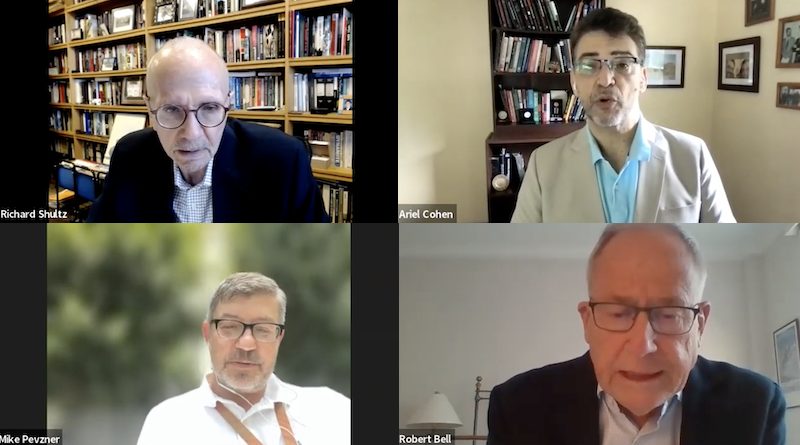“Where is the clock ticking longer, Moscow or Washington?” ask experts, on the outcome of the Russia-Ukraine war
By Vishal Manve, MALD 2023 Candidate, The Fletcher School
On June 2, 2022, the Russia and Eurasia Program at The Fletcher School organized its third panel discussion of the War in Ukraine series, featuring experts from Harvard University and The Fletcher School. This series focused on three key areas impacted by Russia’s war in Ukraine: the humanitarian crisis, the economy, and international security.
The third event in the series centered around the ongoing war, its impact on Ukraine’s international security, and its geopolitical implications for the Western security apparatus. The session comprised Michael Pevzner, senior advisor to the Senate Intelligence Committee, Ariel Cohen from the Atlantic Council, and Robert Bell of the Georgia Institute of Technology.
The panel was moderated by Richard Shultz, Shelby Cullom Davis Professor of International Security Studies at The Fletcher School.
Professor Shultz opened the conversation with a focus on the impact of Western military assistance and the dangers of escalation. This was followed by Cohen’s key takeaways from the war.
“The war in Ukraine is not about Ukraine, but how Russia perceives itself and its role in Europe and the world. It is about the vision of the Russian empire,” Cohen said.
Cohen further mentioned how the vision has been extant for hundreds of years, and that the Russian government’s rhetoric denies the existence of Ukraine as a country.
“If you deny statehood, you deny peoplehood, and the next logical step is to destroy those people…we see elements of that already being in place in Eastern Ukraine,” Cohen stated.
Cohen outlined how the signs of the Ukraine invasion had a decade-long build-up and applauded Ukrainian resistance, terming them “heroes.”
“The heroism of Ukrainian resistance…[the] victories of light infantry over heavy mechanized infantry and armor of the Russian Federation is for the books. While Russia’s GDP is 10 times bigger than Ukraine’s, the West has a GDP 23 times bigger than Russia, so not sure how Russia will win the war in the long run,” Cohen said.
Pevzner, meanwhile, added how the war has shattered multiple assumptions within three months about Russia’s military supremacy.
“Most folks predicted that the war would go down in three to five days between the invasion and Russians…parading down Kyiv, but that hasn’t happened due to remarkably and widely unexpected resistance from Ukrainians, and the U.S. and European assistance in terms of military and non-military,” Pevzner added.
Pevzner further added how the Russian army has been “underperforming—losing a third of their personnel, a quarter of their tanks—committing atrocities, poor leadership, and no unity of command or basic military principles with their seven-pronged invasion.”
“This, on the backdrop of Russia’s success in hybrid warfare, the conflict in Donbas, the 2016 U.S. election interference, and deployment in Syria, took security watchers by surprise,” Pevzner stated.
“The view from the Kremlin is very different as compared to either Washington, Kyiv, or Brussels. This is not just propaganda that Putin and their gang are spinning, but they do see Ukraine in NATO as an existential threat to Russia, and the regime posits all of those things,” Pevzner explained.
Explaining the second and third-tier effects of the war, Pevzner added how the Russian economy has tanked by 10 percent and Ukraine’s has fallen by over a staggering 50 percent. This will impact global commodity prices, starvation, and instability in parts of the Middle East, East Africa, and elsewhere.
“Once this happens, Ukraine, unfortunately, goes down lower on front pages and other news takes center stage; we have a short attention span in Western democracies, as seen in the case of Afghanistan and Somalia,” Pevzner explained.
Meanwhile, Cohen stated how Putin had “single-handedly destroyed 300 years of Russian openness and cooperation and turned Russia into a new North Korea—just a colder, nastier version,” and that thereby the West should use sanctions as a strategic factor to change Russian viewpoints on Putin’s actions.
Pevzner highlighted how Putin, as a leader, uses “some kernel of truth” to weave narratives and use disinformation to change public perceptions within Russia.
“Putin tells Russians that Russia is not attacking, but just defending and under attack. He uses examples of five rounds of NATO expansion since the end of the Cold War. He says the heart of Russian civilization is under attack,” added Pevzner.
The West has an expiration date on public opinion around news headlines and wouldn’t care if it was not in the headlines, which presents a “real danger”, Pevzner cautioned.
On the issue of Sweden and Finland joining NATO, Robert Bell outlined outcomes for the European security architecture.
“It is a huge setback for Putin to have two highly capable Nordic nations joining NATO, and provides the latter a collective defense pool to draw upon and allocate capability targets, define missions, and force structures,” Bell iterated.
Cohen asked further tough questions regarding Putin’s war on Ukraine and its intended and unintended outcomes.
“Who would have thought a KGB Lieutenant General would drag his army into a humiliating military performance, get Finland and Sweden to join NATO, pull out most of his troops from Syria, and give Israel more freedom to take action against Iranian targets?” Cohen asked.
Cohen also said Russia’s outcomes were a “grand strategy failure,” similar to Germany fighting the British Empire, Soviet Union, and the United States in World War II.
“I am hoping Russia makes miscalculations on that scale. It’s a Potemkin grand strategy failure,” Cohen said.
Professor Shultz added that Putin made “tremendous miscalculations and believed his military was much more capable than initially thought of. It’s not just the problem of conscripts and logistics, but the overall corruption in the system.”
“China is probably looking at Russia and wondering what kind of ally they have,” Professor Shultz concluded.

